This fall I have been thinking and reading a lot about failure. At Let Me Run practice last night we were talking with 5th and 6th grader boys about failure. Our words to live by were “failure is only failure if you fail to try again.” Each boy shared a time in their life that they failed, and then kept trying. We reflected on the season and how many of the boys couldn’t run continuously for a mile at the beginning of the season and tonight all but one of them ran a 5 K. We talked about how we can grow from failure, and the statement, “Fall down seven times get up eight.” As our conversation evolved at the end of practice, we talked about how we didn’t like the statement “Failure is not an option” This quote is often attributed to Gene Kranz (foreground, back to camera), an Apollo 13 Flight Director.
https://www.nasa.gov/multimedia/imagegallery/image_feature_2073.html
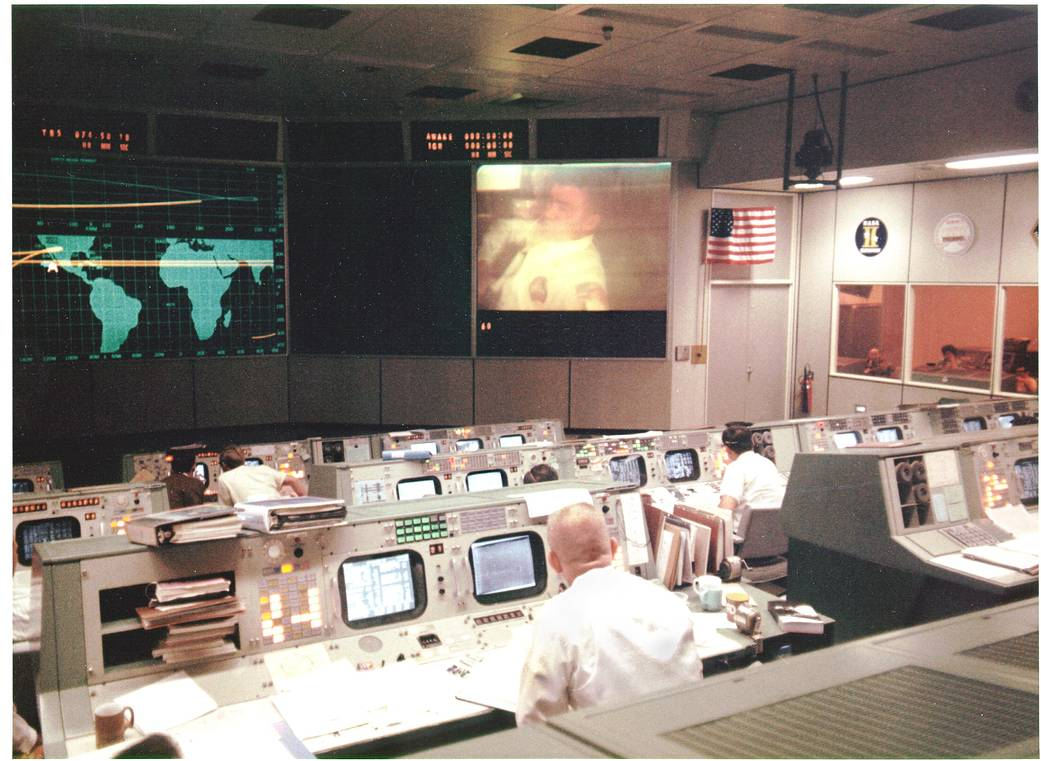
Many of the boys were uneasy with the quote. We fail all the time. What do you mean failure is not an option. If Apollo 13 mission’s success was determined by exploring a crater on the moon, then the mission failed. But if the eventual success of the mission was not giving up on the three Astronauts caught in space then the mission was a huge success. Failure is an option, it is essential to eventual success if you don’t let it define you.
We need to embrace failure as a crucial element of learning. The CEO of the KIPP organization interviewed by the New York Times shares, “Learning from failure leads to humility, adaptation, and resiliency; unfortunately, most students are taught to fear failure from a young age. To combat this trend, educators can emphasize having a growth mindset, encourage learning from past failures, and ask students to reflect regularly on, rather than ruminate over, failures.”
I recently read an article that I shared with the teachers at the STEM Academy, and on twitter. The article was entitled, “Forget The 10,000-Hour Rule; Edison, Bezos, & Zuckerberg Follow The 10,000-Experiment Rule” This article outlines the importance of experimentation, in success in life, and in business. “Deliberate experimentation is more important than deliberate practice in a rapidly changing world.” The same is true of growing up and education. When things don’t go as planned, great! What have we learned, how can we do things differently? Embracing failure as part of growing up, learning, and growing is a key to achieving at a high level. One of the boys in Let Me Run chose a mantra, "I can, I am, I will" and he said this as he ran his 5K last spring. This experience has stuck with me. When I completed my first 1/2 ironman, traveling 70.3 miles of swimming, biking and running, this summer I would say these words to myself. I wanted to complete the event, I wanted to also do it in less than 6 hours. 6 hours and 9 minutes later I crossed the finish line.

Reading Rocks and 21 Day STEAM Challenge.
The STEM Academy is in the middle of our annual read-a-thon fundraiser. Students are reading on the weekend, and at recess to raise money for our natural playground that is sponsored by the parent teacher group. Thank you parent teacher group (PTG) for sponsoring the event, and supporting our school, teachers and students!
I am participating in the 21 day STEAM challenge with my family, and I want to encourage you to do the same. You can sign up for the challenge @ https://www.21daysteam.com/ It’s a great way of looking at the world and it’s also a set of building blocks for innovation and let’s not forget it’s a lot of fun! Why should you make sure that your family or your students have a healthy STEAM diet in their daily life?
  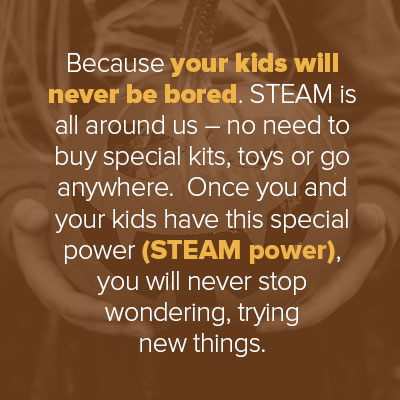
Engagement in school and academic success is a partnership between the family and the school. At the STEM Academy we work hard to inspire students to love learning, and also exemplify that having grit and a growth mindset are as important as getting A’s and B’s or high test scores on standardized exams. You can support this with the STEAM challenge, and by participating in the read-a-thon with your child or teenager.
The parent teacher group meets the second Wednesday of every month in the STEM Lab and all are welcome. The next meeting is November 8th and you can like them on facebook @ www.facebook.com/comstock.STEM.PTG Last summer volunteers from the PTG constructed an outdoor classroom, a ¼ mile jogging and walking trail, and two gaga pits. If your child is gaga for gaga and you are wondering what is this all about watch this ABC story about gaga ball.
This month our family focus is on gratitude. I’m grateful to work at the Comstock STEM Academy. I’m going to give you a little glimpse into some of the awesome things happening around our school. Truly showing gratitude starts with recognizing the benefits we receive from others and then it results in an outward action to make your work, home, & physical environment better.
Last night was a board of education meeting that started with two students on the world champion Stryke Force First Robotics team talking about their experience. A sophomore said when I saw the score, and I saw we were world champions I started shaking and I couldn’t feel my legs. The sense of pride and excitement was palpable. Teachers were honored for the impact they have on students by receiving excellence in education awards. A speech language pathologist shared a moving testament to how the school district, the superintendent, and her staff supported her this past year. I left the board meeting feeling blessed to be a part of this school district.
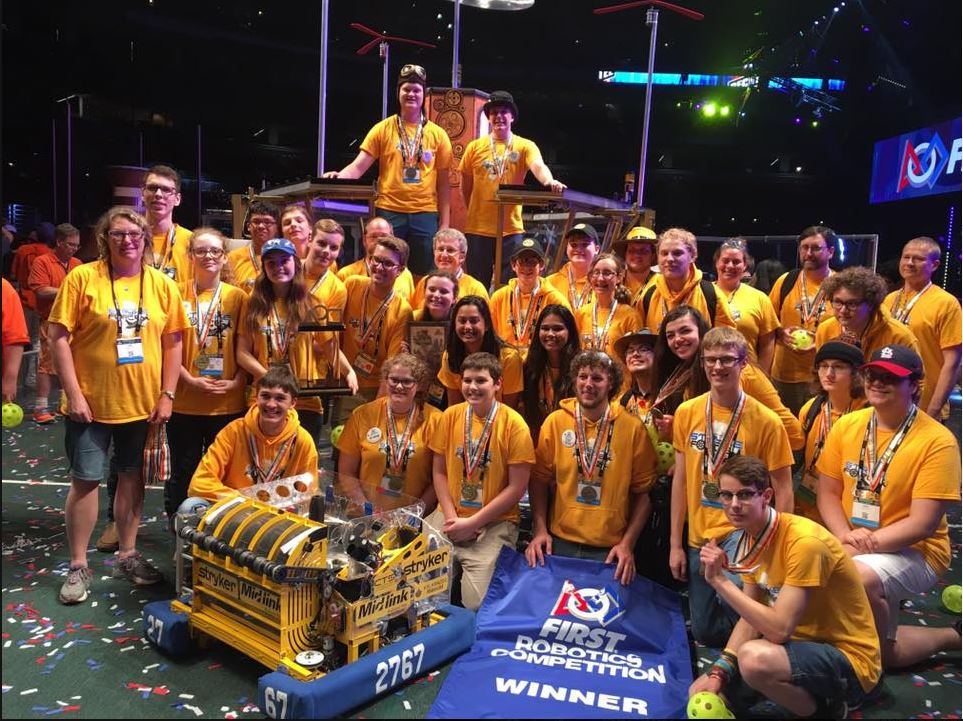
I walked around the school with six families yesterday and talked with them about why our school is a dynamic exciting place to send their child to school. I shared our vision of giving students a solid academic foundation and fostering a love of learning. We visited a middle school science class that was getting ready to dissect sheep hearts. Students were “gloving up,” and donning their lab coats and goggles, a third grader on the tour cringed a little, and the 5th grader stood up a little straighter and leaned in, in anticipation. I asked, “Do you want to see the heart?” His eyes lit up. In kindergarten students greeted visitors with a smile and talked about how much they like recess, hot lunch, and math. First graders were reading books, and working together in learning centers. Second graders were busy sharing the data they collected from a walk to Morrow Lake, and debating if a tree that grows in the water was a land plant or an aquatic plant. Third graders were learning about geometry and discussing polygons. A shy preschooler told one of the students I can draw a cube, and the students said, “Wow that is pretty hard, I can only draw a cylinder” We walked into fourth grade and I thought the students were taking a test. The teacher said we just read two stories, one about “The Case of the Missing Necklace” and the other about “The Case of the Missing Homework.” After reading the source articles students were full of ideas they wanted in include in their rough drafts titled, “The Case of the Missing Hamster.” 5th graders were mapping out food webs, and debating if plants ate sunlight, or how did they get their energy? Visiting the art classroom Mr. G. took a freshly fired first grade flower out of the kiln. It looked like a new species of purple, glassy, hibiscus.
Last week after school 40, 3rd through 6th graders from Let me Run, and Girls on the Run ran a practice 5k in 40® and rainy weather. We were soaked, and we had a blast. Many students ran further than they ever have before. Parents and coaches ran, or cheered in the rain. I’m grateful to encourage, and run with our teams.
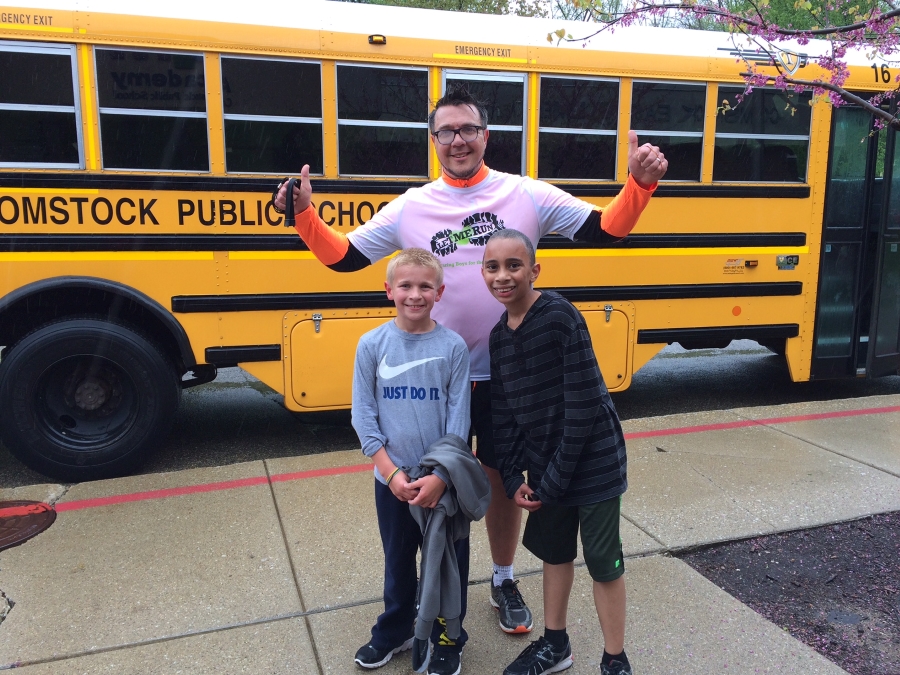
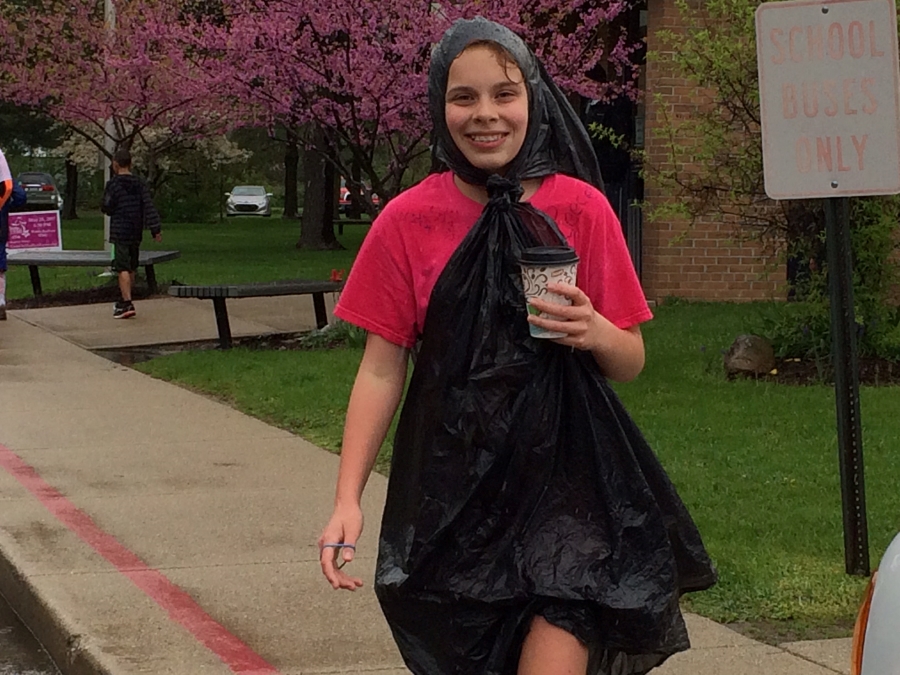
Throughout the day teachers work to excite, encourage, and challenge students and that doesn’t happen by accident. Behind the scenes teachers come in on weekends, during the summer, and in the evening (two of them missed board recognition because they were at school planning and prepping for the next day). They bring papers home to grade and plan once their own kids are asleep, and the dishes are done. They spend their own money, or work extra to write grants and go to the public library to fill their rooms with books, and resources to provide opportunities for students. They shove food in their mouth in 15-20 min by the time they drop their students off at recess and warm up the leftovers they brought for lunch. I was a teacher for 10 years before I became the director of the STEM Academy, I know. Teacher thank you for all you do to make the STEM Academy an exciting place to go to school!
This month let’s recognize and appreciate the benefits our kids receive from their teachers. Let’s show them a little love and tell them they are appreciated. Write them a note, bring them an apple. Smile and say thanks.
To learn more about gratitude watch this 4 minute video from Dr. Robert Emmons of UC Davis.
Dr. Robert Emmons of UC Davis talks about Gratitude from Character Lab on Vimeo.
Here is an article from Harvard Ed. Magazine. It resonates with me as I have meetings with parents who say my child is bored... and I reply as my mom used to reply to me if I ever dared to say that forbidden 5 letter word, boredom is a personal problem, go out and play, climb a tree, read a book, catch frogs in the creek.

As I walk around the STEM Academy, most days I see engagement, excitement, and challenge. Lets continue to put the responsibility for learning to students, the responsibility for engagement to students, but lets also strive to show them how the work we engage in is relevant. Encourage your kids, preteens and teens to rise to the challenge. Work hard even when you don't feel like it. Feel the sense of satisfaction that comes from doing the right thing when no one is watching. Reading this article helped me add tools to my education tool belt to support teachers, students and parents.
From the article “We have to stop seeing boredom as a frilly side effect. It is a central issue. Engagement is a precondition for learning,” he adds. “No learning happens until students agree to become engaged with the material.”
"“If you see human potential as a bell curve and there are only some kids who are going to be great and most kids are mediocre, then engagement really wouldn’t matter,” Rose says. “But if you really believe that all kids are capable, then you would build environments that really worked hard to sustain engagement and nurture potential.”
"Rose adds that high schools rarely take advantage of an adolescent’s cognitive development. Teenagers “take on identities; they’re more socially oriented. This is the first time when abstract ideas can be motivating. They become more politically engaged and think about things like justice. Yet we’re still keeping them in the kind of education system... that wants nothing from them in terms of their own ideas. School has already decided what matters and [what it] expects from you. It’s like an airplane: Sit down, strap in, don’t talk, look forward. Why would it be meaningful?”
The beauty of relevance, Rose says, “is that it’s free. If you’re an educator or curriculum developer, and you saw your responsibility to ensure every kid knew why they were doing what they were doing, you can do that tomorrow.”
"But the biggest shift we need,” Rose believes, is much more elemental. “We need to get away from thinking that the opposite of ‘bored’ is ‘entertained.’ It’s ‘engaged.’” It’s not about pumping cartoons and virtual reality games into the classroom, it’s about finding ways to make curriculum more resonant, personalized, and meaningful for every student. “Engagement is very meaningful at a neurological level, at a learning level, and a behavioral level. When kids are engaged, life is so much easier.”
Ms. Anderson the 2nd grade teacher at the STEM Academy shares this video with her students.
I'm encouraged and excited to lead a building that values engagement, and works to meet the needs of ALL students. What are ways you battle boredom? How do you encourage your child or student to stay engaged?
-Mr. Chopp
Today I received a book from my college and friend Mrs. Caswell @casswellsusan, Grit: The Power of Passion and Perseverance. I have been wanting to read the book since it came out last May. Mrs. Medendorp has read it and shared what she learned with rave reviews. Here is an exert from the amazon.com review of the book.
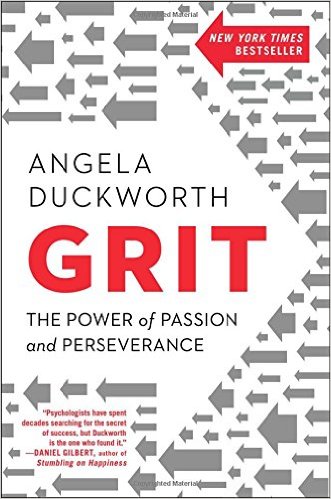
"In this instant New York Times bestseller, pioneering
psychologist Angela Duckworth shows anyone striving to succeed—be it
parents, students, educators, athletes, or business people—that the
secret to outstanding achievement is not talent but a special blend of
passion and persistence she calls “grit.”
Drawing on her own
powerful story as the daughter of a scientist who frequently noted her
lack of “genius,” Duckworth, now a celebrated researcher and professor,
describes her early eye-opening stints in teaching, business consulting,
and neuroscience, which led to the hypothesis that what really drives
success is not “genius” but a unique combination of passion and
long-term perseverance.
In Grit, she takes readers into
the field to visit cadets struggling through their first days at West
Point, teachers working in some of the toughest schools, and young
finalists in the National Spelling Bee. She also mines fascinating
insights from history and shows what can be gleaned from modern
experiments in peak performance. Finally, she shares what she’s learned
from interviewing dozens of high achievers—from JP Morgan CEO Jamie
Dimon to New Yorker cartoon editor Bob Mankoff to Seattle Seahawks Coach
Pete Carroll.
Among Grit’s most valuable insights:
*Why any effort you make ultimately counts twice toward your goal
*How grit can be learned, regardless of I.Q. or circumstances
*How lifelong interest is triggered
*How much of optimal practice is suffering and how much ecstasy
*Which is better for your child—a warm embrace or high standards
*The magic of the Hard Thing Rule
Winningly personal, insightful, and even life-changing, Grit is a book about what goes through your head when you fall down, and how that—not talent or luck—makes all the difference."
If the amazon.com review didn't wet your whistle to learn more about grit maybe Angela Duckworth's TED talk about the subject is more up your alley.
Another great resource is the video from www.characterlab.com about Grit.
Dr. Angela Duckworth talks about Grit from Character Lab on Vimeo.
“The Science of Character” The Science of Character (8 mins) explores the neuroscience and social science that proves that we can shape who we are, and who we want to be in the world.
"The Science of Character" - new 8 min film from The Moxie Institute on Vimeo.
Here is a taste from the discussion guide for (ages 10-14) For complete discussion guide, go here: SOCDiscussionGuideAges10-14.pdf
- Take a look at the periodic table of character strengths. What are your four strongest character strengths? (LINK: PeriodicTableCharacterStrengths.pdf)
- How can you use them to improve your life? How can you use them to improve your community?
- Now look back at the table of character strengths. What are three character strengths you'd like to develop?
- Pick one of the strengths you want to develop. What’s something you could do right now to bring more of that strength into your life?
This month our family focus is on having a growth mindset. Having a growth mindset means understanding that intelligence can be developed. Find out why telling your student, “You’re so smart,” may backfire by watching the video below.
A growth mindset is critical to school success and linked with grit. Research shows that a growth mindset predicts increased academic achievement and can help narrow gaps (e.g., racial achievement gaps, gender gaps) that may be seen otherwise. Post your thoughts on the STEM Facebook page!
|